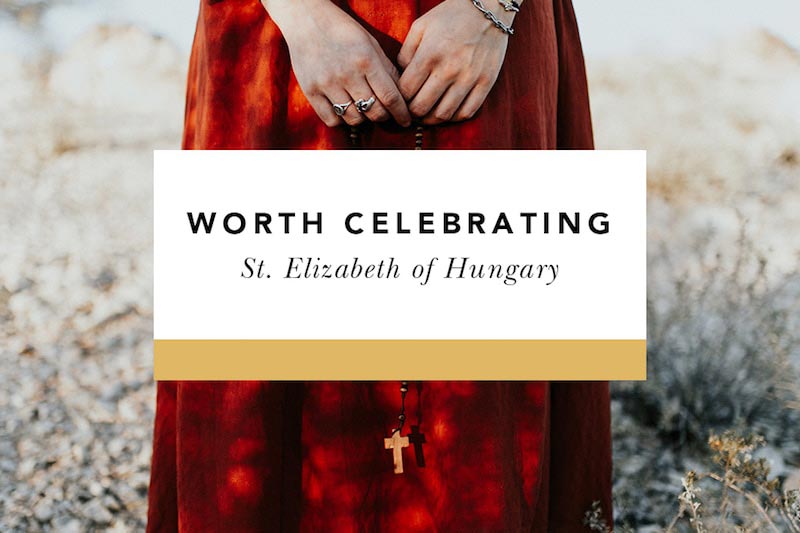
I've met my own modern-day St. Elizabeth of Hungary. Mary Jo Copeland is the founder of Sharing and Caring Hands, based in the Twin Cities. Mary Jo began serving the underprivileged on the streets of Minneapolis in 1985 once her twelve children were attending school. With her prayerful guidance, what began as a way to prevent people from slipping through the cracks of systems designed to help them succeed has become the area’s largest ministry serving those who are homeless, hungry, or disadvantaged. The hallmark of her noble work is the practice of physically washing the feet of those who come to receive services from the organization.
A Full Life is One Worth Celebrating
I met Mary Jo on a college service trip in Minneapolis. She is as sweet and unassuming as you might imagine one in her line of work to be: bobbed hair pinned back, long skirt, and walking shoes. She shared the mission of the organization, its evolution, numbers of volunteer services, and other pertinent information. But, I learned two important things about her in that meeting:
- Her day begins early with adoration and the rosary.
- She and her husband go out dancing. Weekly.
Of all the life-altering and impactful work she has spearheaded over the last 30 years, her relationship with her husband is what is held most dear. What a witness.
St. Elizabeth of Hungary: Wife and Servant to the Poor
Today the Church celebrates the feast of St. Elizabeth of Hungary, another woman whose "yes" to the Lord resulted in radical service to the poor of her own time.
From a young age, St. Elizabeth was influenced by the teachings of St. Francis of Assisi and is said to have spun wool to make clothes for those in need. Her best-known miracle occurred while she was secretly bringing the castle’s bread to the poor, hiding it beneath her cloak. On her way, she passed her husband’s hunting party. In an effort to dispel any idea that she was stealing from the castle, her husband asked her to reveal what she held. When she opened her cloak, rather than bread, red and white roses appeared, eliminating any suspicion of theft and confirming for Louis that her charitable work was blessed by God. Certainly within her marriage, Elizabeth is remembered for taking the lead in charitable giving, but was greatly supported by her spouse in so doing.
After she was widowed at age 20, she continued to serve by building a hospital and personally attending to its patients. Elizabeth’s life was quite short. She died at the age of 24. Nonetheless, she is remembered for her unlikely tendency toward charity and service, precisely because of her nobility—to which, she responded:
How can I bear a crown of gold when the Lord bears a crown and thorns and wears it for me!
Women Worthy of Imitation
Of all the stories of those who have lived holy, God-honoring lives, the stories I like best are the ones no one saw coming. Those people from whom the world believed it knew what to expect. Each of these two women's service to God through service to those on the margins far outweighs what anyone might have imagined them capable of - whether as a mother of twelve or a young widowed princess.
These women are kindred spirits. The give of themselves in both the role of the served and the servant. They see an unmet need and they meet it.
We recognize these women among us. Maybe it’s your mom, sister, grandma, aunt, neighbor, best friend; maybe it’s you! Maybe it’s the kind of meaningful work you are praying for. Maybe it feels laughable that God could be calling you into the deep waters to do important work. It may have felt laughable for Mary and Elizabeth as well.
It is worth mentioning that each woman is known for the groundedness they describe within their marriage. It isn’t that their husbands work(ed) by their side and gave it all up for the greater glory; but that they each recognized and honored the sacred work God had invited their wives to take part in. This is important because there are countless examples of vowed religious women who have worked tirelessly to change the world by their charism, zeal, energy, and enthusiasm. The collection of married women who serve, and serve better because of their vocation as married women, are a quiet minority, and they are worth celebrating.
Is your spouse your greatest sideline support system? Do you offer the same support? Perhaps this is the type of marriage for which you are praying—either within your current relationship or a future vocation. What kind of fruits might we see on behalf of the Kingdom if we were to follow the lead of women like Elizabeth of Hungary and Mary Jo, to encourage and be encouraged by those closest to us?






























